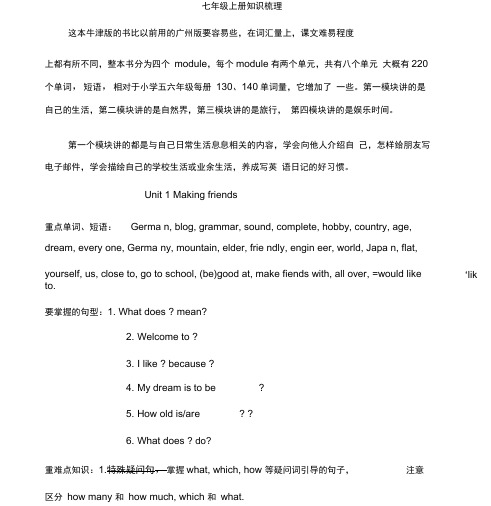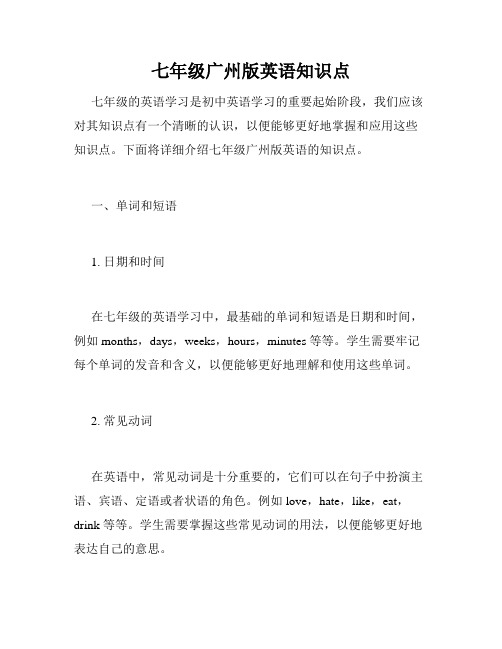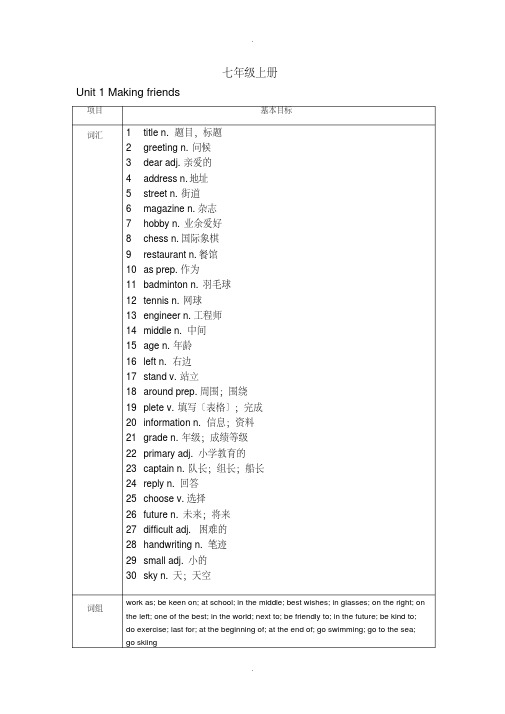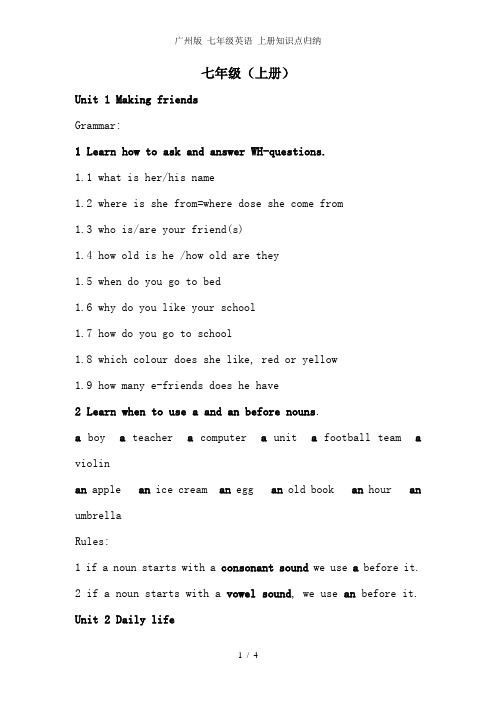广州初一英语教材梳理
广州最新版英语七年级(上册)教材梳理

七年级上册知识梳理这本牛津版的书比以前用的广州版要容易些,在词汇量上,课文难易程度上都有所不同,整本书分为四个module,每个module有两个单元,共有八个单元大概有220个单词,短语,相对于小学五六年级每册130、140单词量,它增加了一些。
第一模块讲的是自己的生活,第二模块讲的是自然界,第三模块讲的是旅行,第四模块讲的是娱乐时间。
第一个模块讲的都是与自己日常生活息息相关的内容,学会向他人介绍自己,怎样给朋友写电子邮件,学会描绘自己的学校生活或业余生活,养成写英语日记的好习惯。
Unit 1 Making friends重点单词、短语:Germa n, blog, grammar, sound, complete, hobby, country, age,dream, every one, Germa ny, mountain, elder, frie ndly, engin eer, world, Japa n, flat,yourself, us, close to, go to school, (be)good at, make fiends with, all over, =would like‘lik to.要掌握的句型:1. What does ? mean?2. Welcome to ?3. I like ? because ?4. My dream is to be ?5. How old is/are ? ?6. What does ? do?重难点知识:1.特殊疑问句,掌握what, which, how 等疑问词引导的句子,注意区分how many 和how much, which 和what.学习参考2. 不定冠词a/an的用法,注意a和an的区别,可以拓展讲定冠词the的用法。
3. 在表示某种球类运动时,直接用play+表球类的单数可数名词”,如:play football等。
七年级广州版英语知识点

七年级广州版英语知识点七年级的英语学习是初中英语学习的重要起始阶段,我们应该对其知识点有一个清晰的认识,以便能够更好地掌握和应用这些知识点。
下面将详细介绍七年级广州版英语的知识点。
一、单词和短语1. 日期和时间在七年级的英语学习中,最基础的单词和短语是日期和时间,例如 months,days,weeks,hours,minutes 等等。
学生需要牢记每个单词的发音和含义,以便能够更好地理解和使用这些单词。
2. 常见动词在英语中,常见动词是十分重要的,它们可以在句子中扮演主语、宾语、定语或者状语的角色。
例如 love,hate,like,eat,drink 等等。
学生需要掌握这些常见动词的用法,以便能够更好地表达自己的意思。
3. 学科专业词汇除此之外,学生还需要学习一些学科专业词汇。
例如geography,history,mathematics,chemistry,biology 等等。
这些词汇是学生学习特定学科的必要基础,可以在今后的学习生涯中派上用场。
二、语法1. 一般现在时在语法方面,七年级的英语学习重点在于一般现在时。
这是英语中最基础的时态之一,它描述的是现在或者一般习惯。
例如:I speak English every day. 学生需要掌握如何正确构造一般现在时的句子,并且灵活运用在日常的口语交流当中。
2. be 动词除了一般现在时之外,be 动词也是七年级重点之一。
be 动词用来表达状态、身份、位置等特定含义。
例如:He is a teacher.She is sitting over there. 学生需要掌握 be 动词的用法,并且能够准确运用在句子中。
3. 介词介词在英语中也是一个重要的语法要点。
介词可以用来描述时间、地点或者方向等。
例如:I have a meeting at 3 o'clock. The book is on the table. 学生需要熟练掌握各种介词的用法,并且理解介词在句子中的作用。
广州初一英语上册重点归纳

广州初一英语上册重点归纳一、基础语法知识初一英语上册的语法重点主要集中在名词、冠词、代词、形容词和副词等基础语法知识上。
学生需要掌握名词的单复数形式,以及冠词在句子中的作用和用法。
同时,学生还需要了解代词的基本用法,如人称代词、物主代词和反身代词等。
在形容词和副词的学习中,学生需要了解形容词和副词的用法和区别,以及形容词和副词的比较级和最高级的构成和用法。
二、词汇积累初一英语上册的词汇量比小学阶段有所增加,学生需要掌握的词汇量包括家庭成员、动物、食物、颜色、数字等主题的相关词汇。
学生需要注重词汇的积累,通过反复练习和记忆,逐渐扩大自己的词汇量,为以后的英语学习打下坚实的基础。
三、口语表达初一英语上册的口语表达要求比小学阶段有所提高,学生需要能够运用所学知识进行简单的日常对话和自我介绍。
学生需要通过多说多练,提高自己的口语表达能力,同时还需要注重语音语调和语速的练习,以培养自己的语言感知和表达能力。
四、听力理解初一英语上册的听力理解要求比小学阶段有所提高,学生需要能够听懂简短的对话和短文,同时还需要能够根据听到的内容选择正确的答案。
学生需要通过多听多练,提高自己的听力理解能力,同时还需要注重语音和语速的练习,以适应不同口音和语速的英语听力材料。
五、阅读理解初一英语上册的阅读理解要求比小学阶段有所提高,学生需要能够读懂简短的英文文章,同时还需要能够根据文章内容回答问题。
学生需要通过多读多练,提高自己的阅读理解能力,同时还需要注重阅读技巧的训练,如略读、寻读、猜测词义等。
六、写作技巧初一英语上册的写作要求比小学阶段有所提高,学生需要能够写出简单的英文短文和书信,同时还需要能够根据提示完成填空和连词成句等练习。
学生需要通过多写多练,提高自己的写作能力,同时还需要注重语法和拼写的练习,以及掌握基本的写作技巧和格式。
七、文化背景了解初一英语上册开始涉及到一些西方文化背景知识,学生需要了解一些西方国家的基本文化习俗和生活方式。
广州人教版2024七上英语书

广州人教版2024七上英语书
一、学习目标
1. 掌握本单元主题相关的词汇和句型,能够正确使用姓名和
问候语。
2. 能够正确使用第一人称和第二人称代词,如I, you, me等。
3. 能够用英语介绍自己的基本信息,包括年龄、性别、职
业等。
二、重点词汇和句型
1. 词汇:name, age, gender, profession, introduce, introduce yourself
2. 句型:What's your name? My name's (your name). Nice to meet you. Hello/Hi (your name).
三、课文内容
1. Gina的自我介绍:My name's Gina. I'm 13 years old.
I'm a girl. I like playing soccer and listening to music. 2. 与他人打招呼的常用语:Hello/Hi, nice to meet you. Nice to meet you, too.
四、课后练习
1. 完成课后单词和句型的练习。
2. 尝试用英语介绍自己的基本信息,并与同学进行交流。
3. 练习对话,掌握常用问候语和自我介绍的表达方式。
以上是广州人教版2024七上英语书的一部分内容,如果您需要更多信息,请参考教材正文或相关参考资料。
2021年广东中考英语人教版教材梳理七年级(下册)Unit 1~Unit 6

20. 熊猫 ________p_a_nda 23. 友好的 ___fr_i_e_n_d_ly__
26. 报纸 __n__ew__s_p_a_p_er
词形变化
1. swim(v.& n.)游泳—___s_w_a_m____(过去式) —___s_w_u_m____ (过去分 词) —__s_w_i_m_m__i_n_g (现在分词) —__s_w_i_m_m__e_r_(n.) 游泳者 2. draw (v.)画—___d_r_ew_____(过去式)—___d_r_a_w_n___(过去分词) 3. speak (v.)说(某种语言); 说话—___s_p_o_k_e___(过去式) — __s_p_o_k_e_n___(过去分词) —_s_p_e_a_k_e_r___(n.) 讲 (某种语言) 的人; 发言者
5. 电(视)台;车站 ___s_t_a_t_io_n__
6. 锻炼;练习 ___e_x_e_r_c_is_e_
7. 品尝;味道 ____ta_s_t_e___
8. 一百 ________h__undred
9. 村庄;村镇___v_i_ll_a_g_e__
10. 桥 ___b_r_i_d_g_e__
15. 散步;走一走 _t_a_k_e_a__w_a_l_k 16. 要么……要么……;或者……或者 __e_i_th_e_r__…__o_r__…______ 17. 大量;许多 __l_o_ts__o_f ___ 18. 到达 ___g_et__to____ 19. 乘地铁 ___ta_k_e__t_h_e_s_u_b_w_a_y________ 20. 骑自行车 __r_i_d_e_a__b_ik__e_/_b_y__b_ik_e______ 21. 认为;想起 ___th_i_n_k__o_f _ 22. 在……和……之间 ___b_e_t_w_e_e_n__…__a_n_d__…_______
广州初一上册英语知识点总结归纳

广州初一上册英语知识点总结归纳在广州初一上册的英语学习中,我们学习了许多重要的知识点,这些知识点对于我们建立英语基础、提高语言能力非常关键。
本文将对广州初一上册英语的重点知识进行总结归纳,帮助大家更好地理解和记忆这些知识点。
一、基本语法1. 词汇、词性和句子结构在初一上册的课程中,我们学习了许多词汇和词性,例如名词、动词、形容词和副词等。
我们还学习了如何使用这些词汇构建句子。
句子结构包括主语、谓语和宾语等要素,了解这些基本概念对于正确理解和使用句子非常重要。
2. 时态和语态在初一上册的学习中,我们初步接触了英语中的一些基本时态,如一般现在时、一般过去时等。
我们学会了根据句子的时间状语和动词形式来确定时态的使用。
此外,我们还学习了主动语态和被动语态的构成和使用方法。
3. 语法规则和句型在初一上册的英语学习中,我们对一些常见的语法规则和句型进行了学习和掌握。
例如,肯定句、否定句和疑问句的构成,以及一些特殊句型的使用,如There be句型等。
了解这些语法规则和句型的正确使用对于我们的英语表达能力至关重要。
二、词汇与短语1. 四会单词与基本短语在广州初一上册的英语学习中,我们学习了一些四会单词和基本短语。
这些词汇和短语是我们英语学习的基础,包括各种日常生活的基本词汇和表达方式,如数字、颜色、身体部位、家庭成员等。
通过掌握这些词汇和短语,我们可以更好地进行基本的交流和理解。
2. 高频短语与表达方式除了基本的词汇和短语之外,我们还学习了一些高频短语和表达方式。
这些表达方式包括日常交流中常用的问候语、道歉、感谢等表达方式,以及描述人物特征、爱好等的常见短语。
掌握这些高频短语和表达方式,有助于提高我们的口语表达能力和日常交流的流利度。
三、阅读与写作1. 阅读理解在初一上册的英语学习中,我们进行了一些阅读理解的训练。
通过阅读不同的材料,包括短文、对话和图表等,我们学会了通过阅读获取信息、理解文意和回答问题。
掌握阅读理解的技巧,对于我们在学习和考试中都非常有帮助。
广州牛津版七年级上册知识点总结

七年级上册Unit 1 Making friends项目基本目标词汇 1 title n. 题目,标题2 greeting n. 问候3 dear adj. 亲爱的4 address n. 地址5 street n. 街道6 magazine n. 杂志7 hobby n. 业余爱好8 chess n. 国际象棋9 restaurant n. 餐馆10 as prep. 作为11 badminton n. 羽毛球12 tennis n. 网球13 engineer n. 工程师14 middle n. 中间15 age n. 年龄16 left n. 右边17 stand v. 站立18 around prep. 周围;围绕19 plete v. 填写〔表格〕;完成20 information n. 信息;资料21 grade n. 年级;成绩等级22 primary adj. 小学教育的23 captain n. 队长;组长;船长24 reply n. 回答25 choose v. 选择26 future n. 未来;将来27 difficult adj. 困难的28 handwriting n. 笔迹29 small adj. 小的30 sky n. 天;天空词组work as; be keen on; at school; in the middle; best wishes; in glasses; on the right; on the left; one of the best; in the world; next to; be friendly to; in the future; be kind to; do exercise; last for; at the beginning of; at the end of; go swimming; go to the sea; go skiingUnit 2 Our daily life项目基本目标词汇 1life n. 生活;生命2probably adv. 很可能;大概3most adj.〔数量上〕最多;最大4find v. 找到;发现5daily adj. 每日的;日常的6top adj.〔位置、级别或程度〕最高的7business n. 公司;生意8still adv. 还是;仍然;依旧9 wash v. 洗;洗脸〔或手等〕;洗澡10 uniform n. 制服;校服11 discuss v. 讨论12 make v. 做;使得13 twice adv. 两次14 club n. 俱乐部;社团15 once adv. 一次16 continue v. 继续17 brush v. 用刷子刷18 activity n. 活动19 guard n. 警卫;卫兵;看守20 construction n. 建筑;建造;施工21 dentist n. 牙科医生22 manager n. 经理;老板23 charge n. 主管;掌管;管理24 careful adj. 仔细的;慎重的;谨慎25 dangerous adj. 有危险的;不安全的26 parcel n. 包裹27 honestly adv. 诚实地28 mean v. 意思是;表示…的意思句型 1.I would like to...2.How many people are there in your family?3.What do they do?4.Here are some things about...5.What is your favourite...?语法1.特殊疑问词的用法2.定冠词、不定冠词的用法29 angry adj. 愤怒的;生气的30 hold v. 抱住;拿着;抓住31 husband n. 丈夫32 finger n. 手指33 except prep. 除…之外34 biology n. 生物词组the same as; find out; daily life; top student; have breakfast; make phone calls to; on the way to; have lunch; e back to; have dinner; work on; halfan hour; walk home; in charge of; look after; by bus; be late for; getangry; tell the truth; go jogging; except for; on weekdays句型 1.Once a week I have piano lessons.2.How often do you...?3.Can you tell me...?语法 1.一般现在时〔三单变形规那么〕2.频度副词及频度副词短语3.动词三单加“s〞及名词单复数读法Unit 3 Troubles项目基本目标词汇 1 deal v. 处理2 argue v. 争吵;吵架3 steel n. 钢4 purse n. 钱包5 follow v. 跟随6 hurry v. 匆忙;加速7 report v. 举报;报告8 minute n. 分钟9 side n. 一边;一旁;一侧10 river n. 江;河11 already adv. 已经12 project n. 课题13 hurt v. 受伤;伤害14 without prep. 不用;不带;没有15 guilty adj. 内疚的16 description n. 描写;形容;说明17 thief n. 小偷;贼18 arrive v. 到达;抵达19 ticket n. 票;券20 newspaper n. 报纸21 button n. 按键22 lift v. 抬起23 downstairs adv. 往楼下;在楼下24 postman n. 邮递员25 delicious adj. 美味的;可口的26 present n. 礼物27 helicopter n. 直升机28 university n. 大学;高等学府29 pare v. 比较;对比30 mind n. 想法31 lie n. 谎言;谎话32 return v. 归还;返回33 reason n. 原因;理由34 point n. 具体细节;重点;观点35 moment n. 时刻;片刻36 possible adj. 可能的;能做到的词组deal with; happen to; hold out; run away;go after; on the other side of; in handcuffs; stay up late; be angry with; think about; walk around; on one'sown; on the side of; in a hurry; quarter of an hour; have time for fun;without question; pare...to...; as...as; either...or; tell a lie;right away, at thesame time; just at that moment; e up to; look around; as soon as possible 句型 1.She should not...2.Must I...?3.You ought to...4.How are you feeling?语法 1.一般过去时2.表过去的时间状语3.动词+ed的发音Unit 4 Hobbies项目基本目标词汇 1 star n. 恒星;星;星状物2 expensive adj. 昂贵的3 through prep. 从一端到另一端;穿过;贯穿4 group n. 组;群;类5 shape n. 现状6 move v. 〔使〕改变位置;移动7 however adv. 然而;不过8 another pron. 又一;再一;另一〔事物或人〕9 planet n. 行星10 able adj. 能;能够11 even adv. 甚至;还12 size n. 大小;尺码13 photograph n. 照片14 interesting adj. 有趣的;有吸引力的15 remember v. 记得16 especially adv. 特别;尤其17 example n. 例子;实例18 history n. 历史19 mend v. 修理20 collect v. 收藏;搜集21 special adj. 特别的;尤其的22 page n. 页;张23 alone adv. 独自地24 net n. 网25 umbrella n. 伞;雨伞;阳伞26 rush v. 〔使〕仓促行事27 worm n. 蠕虫;虫子28 believe v. 相信29 score v. 得分;计分;评分30 centre n. 中心;正中31 worst adj. 最差的;最糟的32 fold v. 折叠;对折133 paper n. 纸34 corner n. 角;墙角;壁角35 bottom n. 底;底部36 direction n. 方向词组used to; billions of; be able to; take photographs; as well as; all over the world; for example;; look like; in the past; make a lot of friends; at theweekend; hurry up; in a second; think of; in half句型 1.By the way,...2.Wele to...3.For how long do you...?4.Maybe you could...语法 1.“when〞引导的时间状语从句2.“used to〞和"did not use to"用法Unit 5 Encyclopaedias项目基本目标词汇 1 dinosaur n. 恐龙2 statement n. 说法;陈述3 cartoon n. 卡通片;漫画4 character n.人物5 human n. 人类6 gentle adj. 〔性格〕温和的7 meat n. 肉类8 sell v. 出售9 disease n. 疾病;病10 animal n. 动物11 stone n. 石头;石块;岩石12 ancient adj. 古代的;古老的13 sand n. 沙;沙地14 secret n. 秘密;奥秘15 word n. 词;单词;字16 expert n .专家17 discovery n. 发现18 square adj. 〔表示面积〕平方19 government n. 政府20 spend v. 花〔钱〕21 pleasure n. 愉快;乐事22 magic adj. 有魔力的;神奇的23 power n. 能力;能量24 petition n. 比赛;竞赛25 trip n. 旅游;旅行26 cave n. 山洞;洞穴27 hungry adj. 感到饿的;饥饿的28 bamboo n. 竹子29 shoot n. 嫩芽;新枝30 shoulder n. 肩膀31 round adj. 圆形的;球状的32 adult adj. 成年的33 female adj. 雌的;女性的34 protect v. 保护35 law n. 法律;法规36 countryside n. 乡村;农村37 cover v. 覆盖;遮盖词组used to; billions of; be able to; take photographs; as well as; all over the world; for example;; look like; in the past; make a lot of friends; at theweekend; hurry up; in a second; think of; in half句型 1.Will you please...?2.Thank you for your information.3.It is my pleasure!4.Is that true?语法 3.“when〞引导的时间状语从句4.“used to〞和"did not use to"用法Unit 6 Beyond time and space ( I )项目基本目标词汇 1 cage n. 笼子2 adventure n. 奇遇;冒险经历3 towards prep. 向;朝着4 pilot n. 飞行员5 huge adj. 巨大的6 shout v. 叫;嚷7 steel n. 钢8 bar n. 长条;棒9 rise v. 上升;起立10 close v. 关;关闭11 peace n. 和平;平和12 shake v. 颤抖;摇动13 trust v. 信任;信赖14 physics n. 物理15 space n. 空间;太空16 light n. 光;发光体17 cry v. 喊叫18 step n. 台阶19 passenger n. 乘客;旅客20 crazy adj. 疯狂的;离谱的21 petrol n. 汽油22 environment n. 环境23 rat n. 老鼠;耗子24 arrange v. 安排25 island n. 岛;群岛26 below adv. 在下面27 quiz n. 竞赛;比赛28 barbecue n. 烧烤野餐29 shine v. 发光;照耀30 circle n. 圆周;圆圈31 measure v. 测量32 air n. 空气词组land on; get sick; get in; part of; in peace; in pieces; in space; instead of;from now on; get sick; e true; rather than; run out of; take a bath; goaround; full moon句型 1.It must be...2.That sounds interesting!3.What do you think?4.And medicine will cure every illness in the future.5.It's important to protect our environment from now on.语法 1.一般将来时2.表将来的时间状语Unit 6 Beyond time and space (Ⅱ)项目基本目标词汇 1 attack v. 攻击;袭击2 pocket n. 口袋3 asleep adj. 睡着4 interrupt v. 打岔;插嘴5 aim v. 瞄准6 hit v. 命中;击中7 freedom n. 自由8 search v. 搜查;查找9 popular adj. 受欢迎的;当红的10 programme n. 节目11 actor n. 演员12 gun n. 枪;炮13 hide v. 隐藏;躲藏14 joke n. 笑话;玩笑15 machine n. 机器16 copy n. 一本;一册17 base n. 基地;总部;底部18 rope n. 绳子19 tent n. 帐篷20 litre n. 升〔单位〕21 blanket n. 毯子22 break v. 〔使〕破;碎23 enter v. 进入24 touch v. 触摸;碰25 enough adv.& adj. 足够地;充足26 plastic adj. 塑胶的27 room n. 空间28 provide v. 提供;供应29 bicycle n. 自行车30 several adj. 几个;一些31 safe adj. 安全的32 since conj. 因为;既然33 prison n. 监狱词组Leave alone; fall sleep; put out; aim...at...; e out of; tell the truth; play jokes on...; get away from; a first-aid box; in order of; sound like; in fact;break down; provide...with...; live a...life句型 1.What happened to...?2.What do you think of...?3.I would rather...4.If we kill him,we won't be able to open the huge door.5. There was enough room in it for David and they provided him withmany toys.语法 1.方位介词2.不定代词。
广州版 七年级英语 上册知识点归纳

七年级(上册)Unit 1 Making friendsGrammar:1 Learn how to ask and answer WH-questions.1.1 what is her/his name1.2 where is she from=where dose she come from1.3 who is/are your friend(s)1.4 how old is he /how old are they1.5 when do you go to bed1.6 why do you like your school1.7 how do you go to school1.8 which colour does she like, red or yellow1.9 how many e-friends does he have2 Learn when to use a and an before nouns.a boy a teacher a computer a unit a football team a violinan apple an ice cream an egg an old book an hour an umbrellaRules:1 if a noun starts with a consonant sound we use a before it.2 if a noun starts with a vowel sound, we use an before it. Unit 2 Daily lifeGrammar:1 learn how to use the simple tense. P21Definition: to talk about regular actions.Rule p212 adverb and adverbial phrases of frequently p22Always /usually/often/sometimes/seldom/ never (频率从高到低)Rule p23Unit 3 The earthGrammar:1 learn how to use countable and uncountable nuns rule p35 1.1 can have plurals1.2 can use a or an before nouns.Uncountable nouns only take singular verbs.Using there is/are .......疑问句形式:is(不可数或者可数名词单数前)/are (可数名词复数前)there ......Unit 4 SeasonsGrammar: learn how to use adjectivesRule p49 turn nouns into adjective by adding -y to the word . Using a adjective after the verb to be.(am, is ,are)It is +Adjective+ to +a verbUnit5 Visiting the moonGrammar: the simple future tense with will p63the simple future tense with be going to p65Unit 6 Travelling around AsiaGrammar:Conditional sentences (主将从现)If-clause talks about a possible actions and the results of these actions.Unit 7 School clubsGrammar: the simple past tense.Definition: talk about things that happened or did not happened in the past.Most verbs +edVerb ending in -e+dVerbs ending in a consonant letter+y +iedSome verbs ending in a vowel letter +a consonant letter double the final consonant letter+ed(yesterday, last month, two weeks ago,the day before yesterday)Unit 7 collecting thingsGrammar: learn how to use personal pronouns, possessive adjectives and possessive pronouns.。
- 1、下载文档前请自行甄别文档内容的完整性,平台不提供额外的编辑、内容补充、找答案等附加服务。
- 2、"仅部分预览"的文档,不可在线预览部分如存在完整性等问题,可反馈申请退款(可完整预览的文档不适用该条件!)。
- 3、如文档侵犯您的权益,请联系客服反馈,我们会尽快为您处理(人工客服工作时间:9:00-18:30)。
广州初一英语教材梳理Unit 1一般现在时1.用法:经常性、习惯性的动作;目前的状况;客观的事实2.标志词:usually ,often ,always ,sometimes, never ,every day ,every week, once a week等3.基本结构:【be动词时的句型结构】:am is are①肯定句结构:主语+be动词+其他+.例句②否定句结构:主语+be动词+not+其他+.例句:③一般疑问句结构: be动词+主语+其他+?例句:【实义动词时的句型结构】:①肯定句结构:主语+动词原形(或动词第第三人称单数形式)+其他+I /You/get up at 6:00 every day.(第一二人称时,动词用原型)She/He/It gets up at 6:00 every day.(第三人称用第三人称单数)They/We get up at 6:00 every day.(复数用原型)Daming(任何单数人称)gets up at 6:00 every day(用单数人称时用三单)【疑问句】用do或does提问,根据陈述句中动词的词性来判断,是三单的动词就用does,原型的就用do.当三单的句子改为一般疑问句时,在句首加Does,然后动词改为原型。
例句:回答时,Yes/No, I do/don't.Yes/No,he does/doesn't.频度副词的用法1.Always“总是,永远的”表示动作重复,状态继续,中间没有间断:The sun always rises in the east and sets in the west.ually”通常平常”即很少有例外:He usually goes to bed at ten o’clock.3.Often“经常,时常”,表示反复性的动作或状态,中间有间断:He is often late for school.他上学经常迟到。
4.Sometimes “有时”动作偶尔发生:Sometimes he comes by bus, but usually he comes by taxi. 有时他坐公共汽车来,不过他通常还是打的来。
四、单个数字、算式或单个字母作主语时。
Three plus nine is twelve. 三加九等于十二。
"I" is an English letter. "I" 是个英语字母。
“8”is a good number in China. 在中国8是个好数字。
五、不可数名词作主语。
Some water is in the glass. 水在玻璃杯里。
Is there any juice in the bottle? 瓶里有果汁吗?六、指示代词this, that等作主语。
This is a pear. That is an apple. 这是一个梨,那是一个苹果。
七、everyone, everything, something nobody nothing 等不定代词作主语时。
Is everyone here today? 今天大家都到齐了吗?Nobody can answer the question. 没有人能回答出这个问题。
There's something wrong with the computer. 这台电脑坏了。
八、代词one作主语时。
例如:One of them is watching TV. 他们中的一个人正在看电视。
动词第三人称单数的变化规则及发音规律动词的三人称单数与名词复数的变化规律是一样的,而且读音规律也一样.一、大多数动词在词尾加“S”在清辅音音素后发音为[s],在浊辅音音素及元音音素后发音为[z]。
如:①stop-stops [s] ; make-makes [s]②read-reads [z] ; play-plays [z]二、以辅音字母加“y”结尾的,要先将“y”变为“i”,然后在加“es”读[z] 如:fly-flies [z];study-studies [z] ;三、以“s, x, ch, sh”结尾的,在词尾加“es”,发音为[z] 如:teach-teaches [iz]; watch-watches [iz]四、以“o”结尾的动词,加“es”,读[z] 如:go-goes [z] do-does [z]五、下面几个动词变为单数时,原词的元音部分的发音发生了较大的变化,请注意记忆。
如:1、do [du:]-does [dʌz]2、say [sei]-says [sez]六、以不发音字母“e”结尾的开音节词,如果尾音是[s]、[z]时,加“s”后字母“e”发音,与所加“s”一起读做[iz]。
如:close-closes [iz]1.elderold –近---elder older----反-----younger elder sister 姐姐younger sister 妹妹哥哥弟弟怀特先生有两个儿子。
大儿子是医生,小儿子是数学老师。
Mr.white has two sons.The is a doctor and the is a maths teacher.I have a elder sister and a elder brother. 我有一个姐姐和一个哥哥。
2.By表示乘坐交通工具:by bus/train/bike/underground/plane/boat =ride/take a …Every day, I go to school by school bus .每天我乘坐校车去上学。
I often go to my hometown for my summer holiday.Aby train B in the train C in train Dby the train3.the answer to the questionPlease email us your answers to these questions…请把这些问题的答案通过邮件发给我们……. Email 动词email sb sth .4.look like 看起来像What she looks like…她看起来什么样子。
你的老师长什么样子What does you teacher look like?5.n+called 名字叫。
的i got a emailed from a boy called bruche.我收到一个名叫布鲁斯的男孩发来的一封邮件。
6.’d like to =would like to 愿意做。
=want to do疑问形式:would …like to do …否定形式:would not like to do/wouldn’t like to do …I’d like to be your e-friend 我想成为你的网友。
Li jie would like to go shopping with you?7.other 其他的别的常修饰复数名词或不可数名词。
如前面有any,no等词时,也可以修饰单数名词。
My other hobbies are watching…and reading books.我的其他爱好是看。
和看书。
Are there any other students in the classroom.She spends other money on beautiful clothes.8.like doing sth/like to do sth 喜欢做某事,一般情况不可通用My parents like going for a walk after supper.=my parents like to go for a walk after supper.我父母晚饭后喜欢散步。
9.be good at doing sth 擅长于做某事Jack is good at sing . Jack 擅长唱歌。
10.It is+adj.+ for sb to do sth 对某人来说做某事是…It is easy for us to smile to others. 对我们来说,对别微笑是很容易。
11.If you …,you can…如果你…你就能学好英语。
If you study hard,you can learn English well.11. 特殊疑问词Which when how what who where whose whywhat subject do you like best?1.What does your mother do ?...She is teacher.2.Where is your?...He is in the bedroom.3.how old is your little sister?... she is six years old.4.what time does your dad go to work every day ? At about 7:00.5.how many students are there in your class ?...Forty.6.Which class are you in ,class 1 or class 2?...Class 2.7.why do you like making friends with anna? …. Because she is friendly.8.who will help you with English ?...mary .9.whose bag is this ? It’s Tom’s.10.How does your sister go to school?....She goes by bike.What….do you like best? 你最喜欢…?=what is /are your favorite...?What is your favorite film?12.lots of = a lot of 表示许多,后跟可数或不可数名词Many+可数名词,much+ 不可数名词13.Hear from =表示收到某人的来信14.冠词: A an the the+姓氏复数GreensAn apple\orange , an ice cream , an egg, an old book, an umbrella, an elder brother, an uncle, an hour, an honest boy, an important book, an egg, an uncle, an interesting book a university a useful book15.Be from =come from 来自16.Close to 靠近,反义词:far away from 离开远17.All over”全,all over the school 全校all over the city 全市18.Email sb 发电子邮件给某人。
